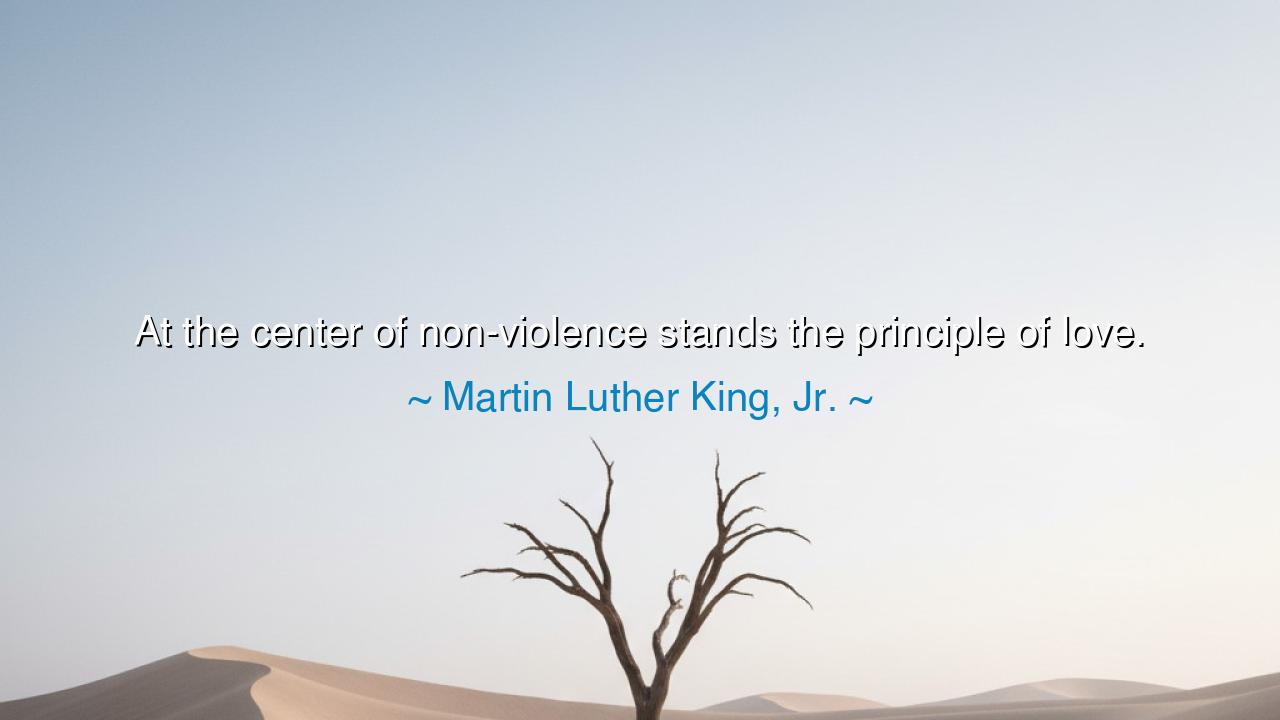
At the center of non-violence stands the principle of love.






“At the center of non-violence stands the principle of love.” – Martin Luther King, Jr.
These words echo through time like the toll of a sacred bell, calling humanity back to its truest nature. In this single sentence, Dr. King reveals the spiritual architecture of peace — that non-violence is not merely the absence of conflict, but the presence of love in its highest, most unyielding form. Love, not as sentiment or weakness, but as divine strength — a force that transforms enemies into brothers and dissolves hatred without spilling a drop of blood. This principle, ancient as the dawn yet reborn in King’s voice, stands as the foundation of moral courage.
In the world of the ancients, sages often spoke of the power of love as the conqueror of all things. Lao Tzu called it the "weapon of the wise," and the Buddha taught that “hatred never ceases by hatred, but only by love.” Centuries later, King carried this same eternal truth into the burning streets of the twentieth century. When the oppressed rose against the injustices of segregation, he urged them not to raise their fists in rage, but their hearts in compassion. To his followers, he declared that non-violence was not a tactic for convenience — it was a way of being. For without love, resistance becomes bitterness; without compassion, victory becomes hollow.
Consider the marchers of Selma, who faced tear gas, batons, and jeering crowds. They did not retaliate, though their bodies were bruised and their dignity trampled. Instead, they walked — steady, prayerful, unbroken — guided by the belief that love could expose the cruelty of hatred for all to see. And it did. The images of their suffering melted hearts across a nation, awakening conscience in those who had long been silent. This was love as power, not softness — the kind of love that endures pain yet refuses to inflict it.
Dr. King’s principle of love did not come from naïveté, but from profound spiritual insight. He saw that violence perpetuates a cycle of fear and revenge, each act sowing the seeds for another. Only love could break that endless chain. To love one’s enemy is not to excuse their actions, but to affirm their humanity even when they cannot see it themselves. Love, therefore, is not surrender — it is redemption, both for the oppressed and the oppressor. It transforms both hearts and histories.
There is a fierce, disciplined courage required to live by this teaching. To stand unarmed before hatred and still respond with love demands more strength than any sword could give. The warrior of non-violence fights not to destroy the enemy, but to destroy the enmity itself. Dr. King stood in that tradition — the lineage of prophets and peacemakers who believed that moral light could pierce the deepest darkness. His love was not passive; it was active resistance, shaped by faith, sacrifice, and the will to endure suffering without surrendering to hate.
Let us remember that non-violence is not a strategy for saints alone. It begins in small moments — in the way we speak to others, the way we handle anger, the way we forgive those who wrong us. Every act of patience, every word of understanding, is a ripple of that same love that moved mountains in Montgomery and hearts across the world. When we choose empathy over judgment, peace over pride, we continue the legacy of those who marched without hate in their hearts.
The lesson endures: where there is no love, peace cannot last. Where there is no compassion, justice cannot thrive. The principle of love stands not at the edges of humanity, but at its very center — calling us back to who we are meant to be. And so, to each soul that hears these words: let your strength be gentle, your purpose be pure, and your resistance be rooted in love. For in the end, as King taught and proved with his life, only love is powerful enough to conquer hate.






AAdministratorAdministrator
Welcome, honored guests. Please leave a comment, we will respond soon